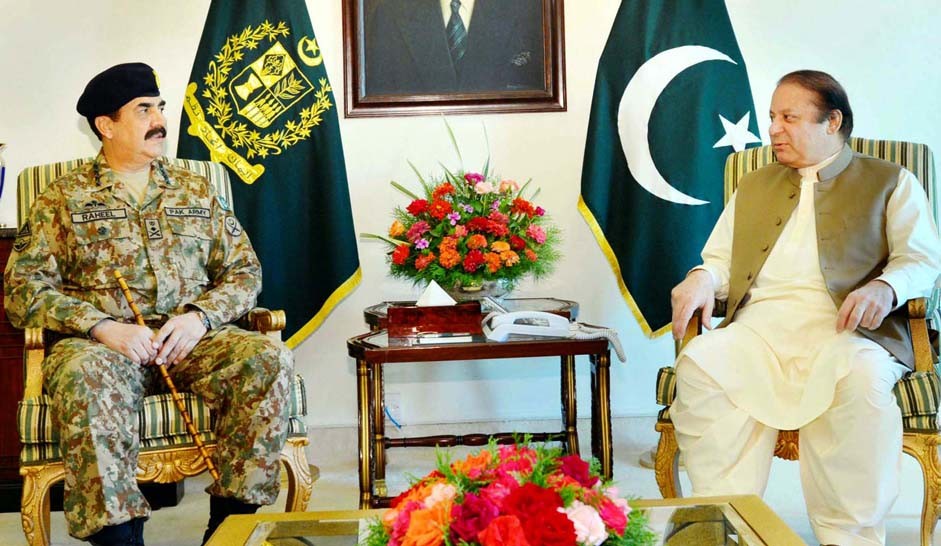
Pakistan’s national security apparatus, rather than the federal cabinet of an elected government, has a strong say in how foreign policy is run, underpinned as it is on how Pakistan views India, Afghanistan, and Saudi Arabia

Pakistan’s foreign policy is driven principally by the doctrine of national security state fashioned around the protection and strengthening of the country’s nuclear arsenal and its projected deterrence value.
This requires the state to retain the capacity of the military to maintain the ‘minimum deterrence value’ of the arsenal. And because the nuclear programme is in the control of the military rather than the civilians -- the only instance out of the seven formal nuclear powers of the world where this is so -- this, in turn, requires the military to retain the project and its attendant capacity to sustain primacy over the national polity.
This is, then, the undeclared mission statement of the state of Pakistan: "Protect the nuclear programme and sustain the military’s capacity to do so, for the protection of the State." That it should be the other way round is the real story of Pakistan --a four-decade struggle by the political forces to transform it from a security state to a welfare state.
This whole debate about Pakistan’s future has been thrown into sharp relief after the game-changing Dec 16 Peshawar Black Day. The resultant re-examination of the gamut of policy-strategy-roadmap on nationally combating terrorism is encouraging but nowhere near enough if the 20-point National Action Plan (NAP) is the benchmark of a new national consensus.
This plan, the apex of the elaborate roadmap being drafted by the government with a hyped civil-military consensus, misses the two key phrases whose absence is a strong indicator that nothing much is changing in regards to the doctrine of security state that underpins Pakistan. One is "civilian-military relationship," and the other is "foreign policy." Without using these phrases -- and creating their own attendant action plans of transformation -- the NAP is simply not mandated to approach these areas as strategic priorities. The screaming absence of these references also serves to emphasise that there is neither a priority nor a possibility of revisiting the blueprint of the security state of Pakistan.
Even at the risk of oversimplifying things it can be safely emphasised that Pakistan’s national security apparatus, rather than the federal cabinet of an elected government, has a strong say in how foreign policy is run, underpinned as it is on how Pakistan views India, Afghanistan, and Saudi Arabia from basically security prisms. India is the raison d’etre of Pakistan’s strong military and the virtually non-negotiable nuclear programme and its first-strike capability that it maintains as an ‘edge weapon’ in the context of national security.
Afghanistan is the raison d’etre of the security establishment’s capacity to project Pakistan’s military and security power in near abroad. The Gulf region -- particularly Saudi Arabia -- is the deep state’s insurance policy on plugging resource constraints to meet the critical mass of finances required to keep the project of national security state afloat because Pakistan’s economy is never quite a safe bet.
All these ‘strategic imperatives’ obviate, from the military establishment’s perspective, the need for trade, cultural or political ties with either India or Afghanistan as the primary interfaces with them or in any way that might undermine the security priorities. Or a pushback of the narrow religious doctrine underpinning the House of Saud that is allowed to be projected into Pakistan as a countercheck to Iran’s capacities for counter-sectarian mischief.
So, without revisiting the civil-military equation in a way that helps renegotiate a change in the parameters of these security priorities of the military establishment, the political establishment’s efforts at combating terrorism insofar as meeting the international aspects of NAP are doomed to remain stunted.
It is bad enough that the NAP document does not explicitly assert the need to change Pakistan’s foreign policy that serves Pakistan’s political priorities (as opposed to the military mission) but even the unstated and implied objectives do not emphasise friendly relations with Pakistan’s neighbours on the basis of equal sovereignty.
The government not being allowed to expand the margins in foreign policy for it to take sustainable initiatives to bridge the trust gaps between Islamabad and Kabul and New Delhi will, therefore, not end in any significant results with the critical mass required to either reduce or reverse direct or indirect, practical or conceptual, assistance to the non-state, trans-national and national militant groups and ideologies. How Pakistan can deal with them effectively without support of countries that border it is one of the key unasked questions that remain unanswered.
After all, if Pakistani deep state is not willing to concede some of its strategic gains on the security fundamentals with India, Afghanistan and Saudi Arabia, why on Earth would they ever reciprocate by helping change a situation that is making the security establishment suffer its own failures? After all, there is no free lunch, not even for friends.
The accumulative result of Pakistan’s foreign policy is a growing net list of enemies, frenemies, and don’t-want-to-be-friends. The principal objective of foreign policy is to make friends. Pakistan is spectacularly failing on this count. And unless Pakistan’s civil-military relations are brought into alignment with this principal objective, it will have to fight battles that need international partnerships on its own. And this means fighting a losing battle. Nobody loves losers.